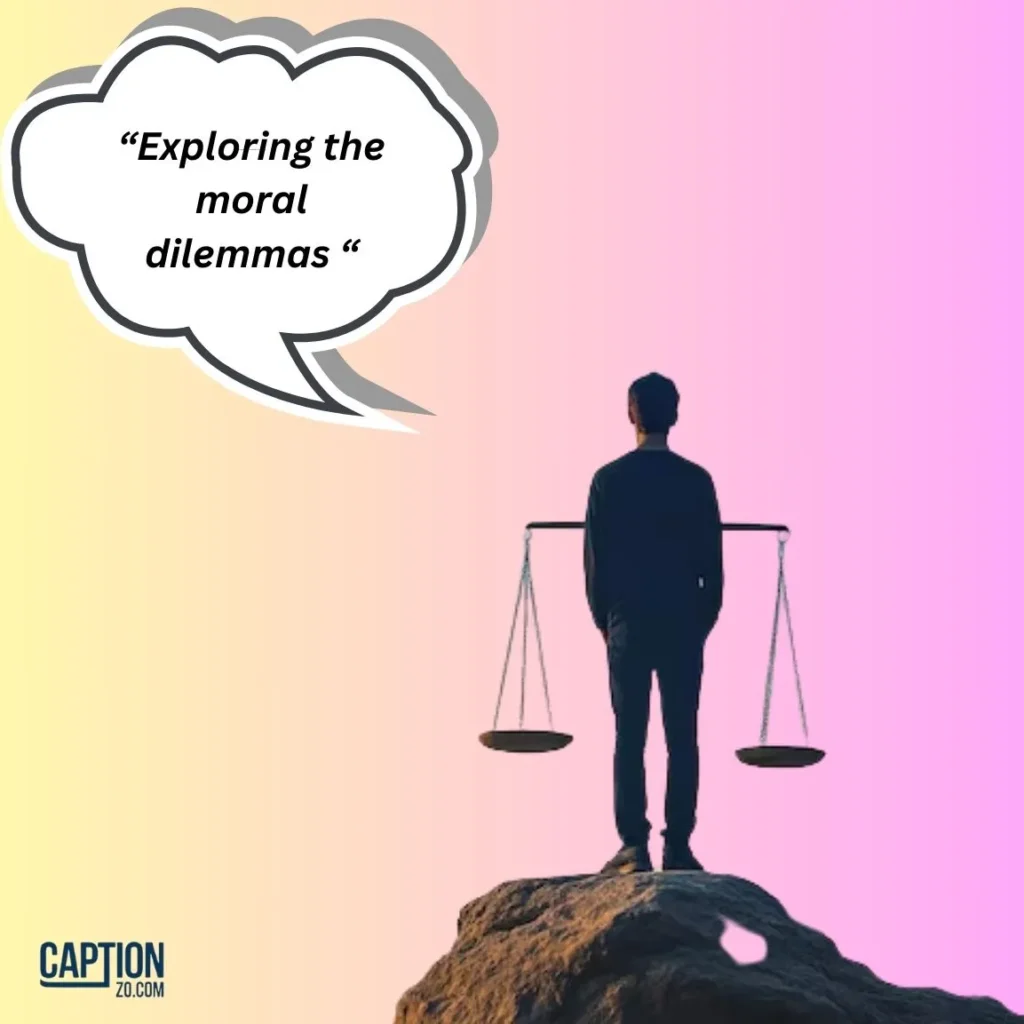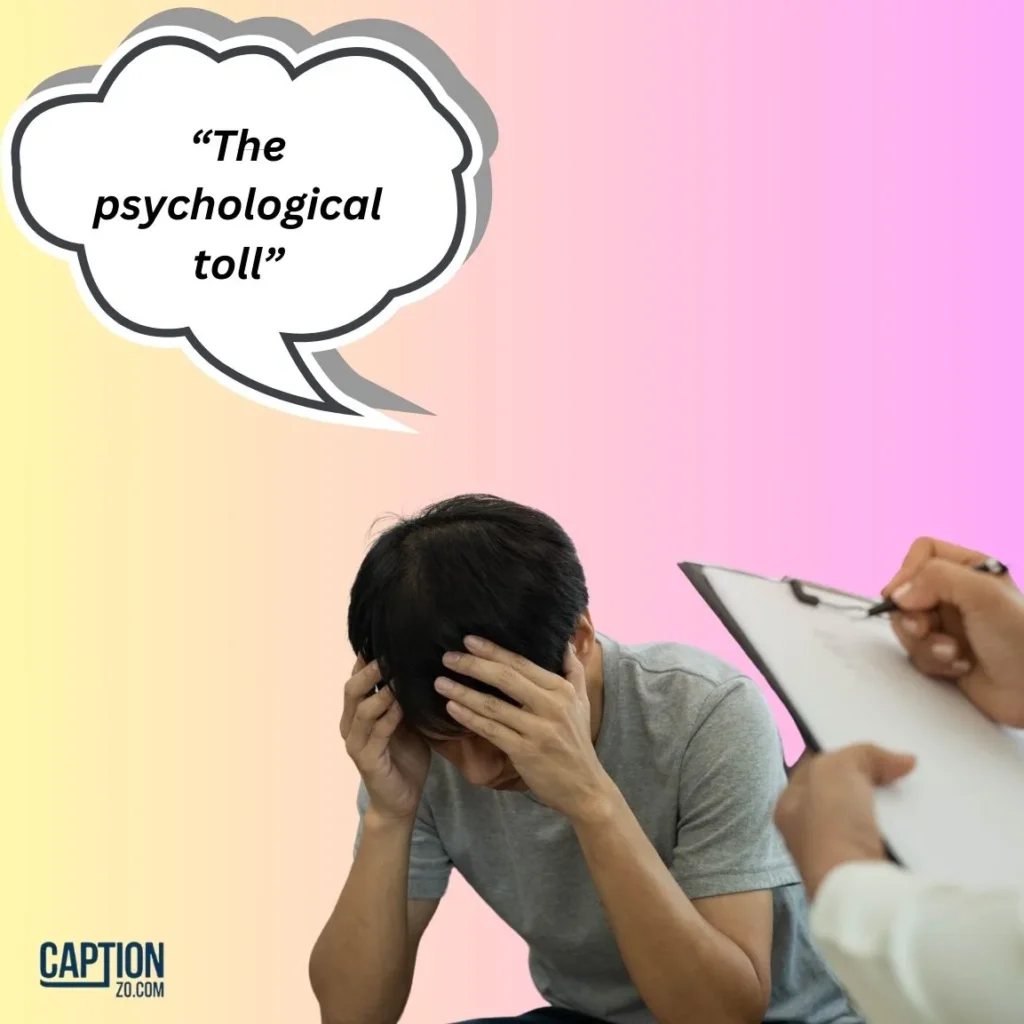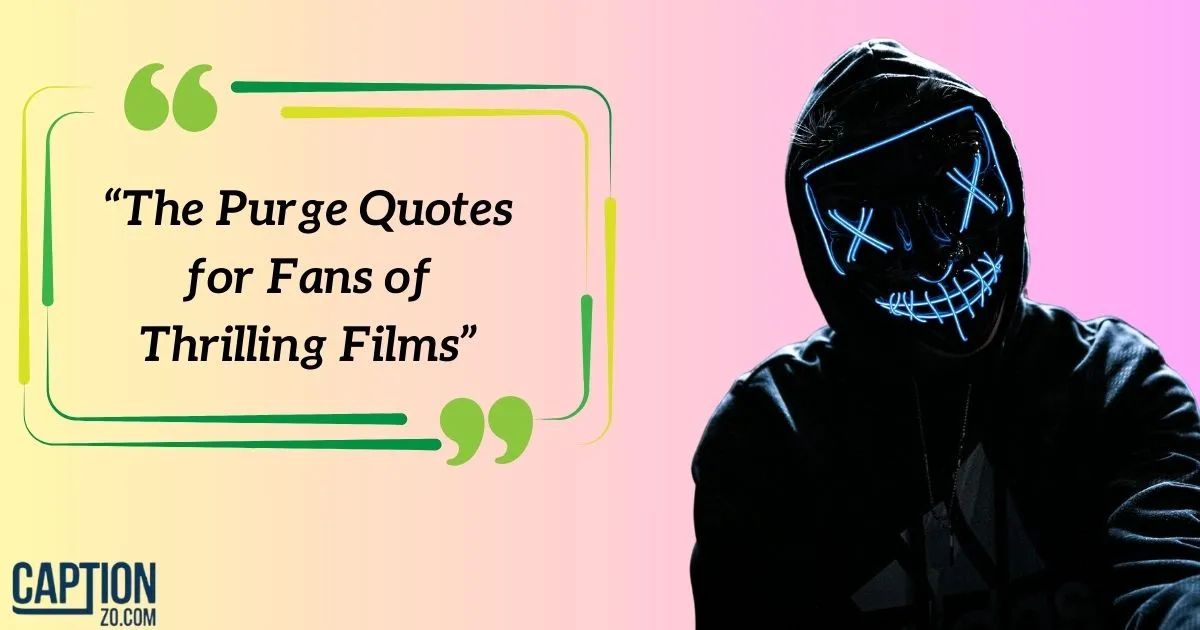“The Purge will unleash a wave of violence… or freedom. It’s up to you to decide.”
The Purge franchise has become a cult favorite for fans of intense, heart-pounding thrillers. The films explore a chilling dystopian world where, for one night every year, all crimes including murder are legal. It’s a concept that shocks and thrills in equal measure, raising deep questions about morality, freedom, and survival. The striking quotes from The Purge films reflect the dark, chaotic nature of this world, where characters are forced to confront their darkest impulses and fight for their survival.
These quotes serve as chilling reminders of the fragile boundaries between law and lawlessness, and the price of living in such an extreme society. When it’s the tension-filled moments leading up to the Purge, or characters grappling with the moral implications of their actions, these lines are as thrilling as they are thought-provoking. Fans of the series are captivated by how these quotes capture the essence of fear, power, and survival in a world where all rules are suspended.
If you’re a fan of The Purge and love the dark and thrilling lines that stay with you long after the credits roll, you’re in for a treat. Here are some of the most iconic and thought-provoking quotes from the franchise, each offering a glimpse into the twisted world of The Purge.
Ethical Dilemmas
- The conflict between personal gain and the greater good.
- Deciding between loyalty and doing the right thing.
- The moral implications of deception for a noble cause.
- Balancing the needs of individuals versus society.
- The ethics of surveillance and privacy violations.
- Is it right to harm one to save many?
- The dilemma of sacrifice in the face of survival.
- Confronting moral responsibility in life-or-death situations.
- The ethics of medical experimentation or scientific advancements.
- Moral consequences of breaking the law for a cause.
- Whether the end justifies the means in political or social movements.
- The moral ambiguity of revenge or punishment.
- Navigating the ethics of charity and wealth redistribution.
- The responsibility of those in power toward the vulnerable.
- The ethical implications of artificial intelligence or technology.
- Exploring the moral dilemmas of euthanasia or assisted suicide.

- Ethical considerations surrounding cloning and genetic engineering.
- The implications of controlling human behavior for a “greater” good.
- Ethical dilemmas in war and armed conflict.
- The moral challenges posed by environmental conservation.
Survival Instincts
- The primal needs to protect oneself from danger.
- Resourcefulness in life-threatening situations.
- The role of fear in triggering survival mechanisms.
- The importance of teamwork and cooperation in survival.
- The instinct to seek shelter or safety.
- The mental fortitude required to survive trauma.
- Sacrificing others for self-preservation.
- The moral implications of survival in a hostile environment.
- The need for food, water, and shelter in life-or-death situations.
- How instincts shape decision-making under extreme stress.
- The balance between survival and compassion for others.
- How survival instincts influence human behavior in crisis.
- The physical toll of prolonged survival efforts.
- The importance of adaptability in changing environments.
- The survival instinct in the face of societal collapse.
- Mental survival: the power of hope and will to survive.
- How survival situations alter relationships and social structures.
- The role of past experiences in shaping survival tactics.
- Coping with isolation and loneliness during survival scenarios.
- The ethical considerations of survival at the cost of others’ lives.
Social Commentary
- The critique of social inequalities and injustices.
- The portrayal of political corruption and its consequences.
- How the media shapes public opinion and societal values.
- The impact of capitalism on human relationships and morality.
- Social dynamics of power, privilege, and oppression.
- Examining the roles of race, class, and gender in society.
- The effects of technology on human connection and identity.
- Criticism of the justice system and law enforcement practices.
- The challenges of balancing freedom and security in modern societies.
- Social perceptions of mental health and its stigmatization.
- The role of education in shaping societal values.
- Exploring the impact of consumerism and materialism on culture.
- The portrayal of marginalized communities in media and politics.
- The consequences of environmental degradation on society.
- The impact of war and conflict on society’s values.
- How societal pressure influences personal decisions.
- Exploring the concept of “the common good” in social policies.
- The relationship between law and morality in societal constructs.
- The effects of societal expectations on individual freedoms.
- How the concept of family and community has evolved over time.
Fear and Paranoia
- The psychological effects of constant fear on individuals.
- How fear drives irrational decisions and behaviors.
- Paranoia’s role in disrupting social relationships and trust.
- The impact of societal fear on collective actions.
- Fear as a tool for manipulation and control.
- The fear of the unknown and its impact on decision-making.
- Psychological effects of living in constant fear or danger.
- The evolution of human fear responses to modern threats.
- How paranoia distorts reality and creates false perceptions.
- Fear in the context of personal safety versus public safety.
- The role of fear in fueling societal divides and prejudices.
- Paranoia’s effect on communities and governance.
- How media sensationalism amplifies fear and paranoia.
- Fear and paranoia in times of political unrest.
- The psychological toll of surveillance and losing privacy.
- The role of fear in shaping public policy and laws.
- Fear of technology and its impact on society’s future.
- Fear of societal collapse and its cultural representations.
- Paranoia in relationships and its corrosive effects.
- How fear influences the development of conspiracy theories.
“Darkness Funny Quotes for a Touch of Humor“
Justifications and Rationalizations
- The mental processes of justifying unethical actions.
- The role of cognitive dissonance in rationalizing behavior.
- Justifying harmful behaviors in the name of survival.
- Rationalizing bad decisions by focusing on the “greater good.”
- How people justify breaking laws for personal gain.
- Rationalizations of privilege in social and economic contexts.
- The use of moral relativism to justify actions.
- How power and authority lead to rationalizing harm to others.
- Justifications for war and violence from political leaders.
- Rationalizing acts of betrayal in the name of loyalty.
- The role of denial in justifying harmful behaviors.
- How self-interest and fear play into moral rationalizations.
- Rationalizing environmental destruction in the name of progress.
- The justification of surveillance for national security.
- How history is often rewritten to rationalize past actions.
- The dangers of rationalizing prejudice and discrimination.
- Rationalizing decisions in business and corporate practices.
- The moral dangers of justifying secrecy and deception.
- The role of the media in justifying public or political actions.
- Justifying corruption and its long-term consequences.
The Impact on Families
- How societal issues strain family dynamics and relationships.
- The role of family in shaping moral and ethical values.
- Family struggles during economic hardship and societal collapse.
- The psychological toll of violence or crime within families.
- How family bonds can either heal or deepen trauma.
- The impact of mental illness on family systems.
- Family as a source of support or conflict during crises.
- Generational divides and the passing of values or trauma.
- The influence of family in shaping personal decisions.
- Family loyalty versus individual autonomy in difficult choices.
- How the justice system affects family units and individuals.
- The emotional toll of divorce and separation on children.
- The role of family in identity formation and self-worth.
- Family responses to addiction and its effect on relationships.
- The impact of social norms on family roles and expectations.
- Navigating cultural expectations of family duty versus personal dreams.
- The difficulty of reconciling family loyalty with moral integrity.
- Family as a force for resilience during adversity.
- The importance of communication in maintaining healthy family relationships.
- The challenges families face when adapting to societal change.
Law and Order
- The role of law in maintaining societal stability.
- Ethical considerations in law enforcement practices.
- The balance between justice and vengeance in legal systems.
- How laws evolve in response to social and political changes.
- The complexities of legal systems in diverse societies.
- The consequences of unchecked authority in law enforcement.
- Disparities in the legal treatment of different social groups.
- The moral duty of citizens to uphold the law.
- The role of law in defining right and wrong in society.
- The tension between law and personal ethics.
- The challenge of enforcing laws that conflict with human rights.
- The impact of legal systems on family life and relationships.
- The importance of due process in the justice system.
- The intersection of law, politics, and power.
- How the law interacts with public opinion and social movements.
- The use of law to justify or prevent societal change.
- The ethical dilemmas faced by law enforcement officers.
- The impact of criminal justice on marginalized communities.
- International law and its effectiveness in global conflict resolution.
- The balance between law enforcement and the preservation of civil liberties.
Psychological Impact
- The trauma of living in constant conflict or danger.
- How war and violence affect mental health.
- The psychological toll of societal and systemic oppression.

- The effects of childhood trauma on adult behavior.
- How isolation influences psychological well-being.
- The impact of fear and paranoia on mental stability.
- The psychological consequences of losing personal freedom.
- Coping with grief and loss in extreme circumstances.
- The effects of prolonged stress on mental health.
- How addiction and dependency alter psychological states.
- The psychological impact of guilt and shame.
- The role of denial and avoidance in mental health.
- Psychological consequences of social alienation.
- The impact of cultural identity on psychological well-being.
- How mental health is portrayed in society and media.
- Coping with the psychological effects of societal collapse.
- The role of therapy and support systems in mental healing.
- The importance of psychological resilience in the face of adversity.
- The effects of societal expectations on individual mental health.
- Psychological recovery after trauma and societal upheaval.
Moral Questions
- The question of right versus wrong in morally gray situations.
- The ethics of making decisions that affect others’ lives.
- Is it moral to sacrifice the few for the many?
- Moral implications of scientific experimentation.
- The moral responsibility of individuals in a corrupt system.
- The conflict between personal desires and moral obligations.
- Morality in the face of survival instincts.
- The morality of revenge versus forgiveness.
- How to reconcile moral values with societal pressures.
- The ethical question of loyalty and betrayal.
- The morality of intervention in other societies or nations.
- Whether morality can exist without consequences.
- The question of moral responsibility in the age of technology.
- Moral implications of environmental exploitation.
- How personal experience shapes our moral beliefs.
- The role of empathy in moral decision-making.
- The moral complexities of laws and regulations.
- The moral costs of political power and control.
- The ethics of civil disobedience in a flawed system.
- The role of morality in forming societal laws.
The Future of Society
- The role of technology in shaping future social structures.
- How climate change will impact societal norms and behaviors.
- The evolution of human rights and justice in future societies.
- How education will adapt to meet societal needs in the future.
- Predictions for the future of law enforcement and security.
- The changing nature of family structures in future societies.
- The potential for globalization to unite or divide societies.
- The future of democracy versus authoritarianism.
- The role of artificial intelligence in societal decision-making.
- How economic systems will evolve in response to inequality.
- The future of the workplace and the impact of automation.
- The social consequences of rising inequality and poverty.
- How social movements will shape the future of governance.
- The impact of technological advances on privacy and freedom.
- How future societies will deal with population growth.
- The role of ethics in the development of new technologies.
- How future societies will address mental health challenges.
- The influence of global conflict on future societies.
- The possibility of creating sustainable, just societies.
- The legacy of today’s actions on future generations.
Key Insight:
1.What is the main concept of The Purge films?
The main concept is that for one night each year, all crimes—including murder—are legal, allowing society to unleash their darkest impulses without legal consequences.
2.What makes The Purge quotes so impactful?
The quotes often challenge the concept of morality, law, and survival, making viewers reflect on society’s darkest side and the choices individuals must make in extreme circumstances.
3.Are there any memorable quotes about survival in The Purge?
Yes! A key theme in the franchise is survival, and some of the most memorable quotes revolve around the lengths people will go to in order to stay alive during the Purge.
4.What is the significance of freedom in The Purge quotes?
The quotes often highlight how freedom is both liberating and dangerous, with the night of the Purge providing an opportunity to either seek vengeance or embrace chaos.
5.How do the quotes in The Purge reflect societal issues?
Many quotes in the films serve as social commentary, commenting on class inequality, power struggles, and the consequences of living in a lawless society.
Wrap-Up
The quotes from The Purge are as haunting as they are gripping. They resonate with fans because they reflect the fundamental human struggle between chaos and order, survival and morality.
These chilling lines remind us of the frighteningly thin line that separates civility from anarchy. As the franchise continues to grow, these quotes will undoubtedly remain etched in the minds of fans, encapsulating the terrifying possibilities of a world where no rules exist.

Hi! I’m Zadie Smith, here at Captionzo.com to inspire your Instagram captions and empower your social marketing journey with fresh ideas.




